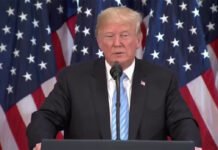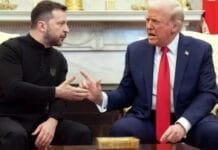The United States, under the leadership of President Donald Trump, took a bold and controversial step by imposing sanctions on the International Criminal Court (ICC). The move, executed through an executive order, came in response to what the Trump administration described as biased and illegitimate investigations targeting the United States and its close ally, Israel.
Trump’s Executive Order Against ICC
On Thursday, President Donald Trump signed an executive order that effectively placed sanctions on ICC officials, their families, and any individuals assisting the court in investigations against the United States or its allies. This measure was introduced as a direct response to the ICC’s attempts to investigate alleged war crimes committed by U.S. troops in Afghanistan and Israeli military personnel in Gaza.
The executive order authorized asset freezes and travel restrictions on ICC personnel, asserting that the court had overstepped its jurisdiction by prosecuting individuals from countries that were not signatories to the Rome Statute, including both the U.S. and Israel.
Accusations of Bias Against Israel
The Trump administration accused the ICC of unfairly targeting Israel, following the court’s decision to issue an arrest warrant for Israeli Prime Minister Benjamin Netanyahu. The warrant, issued in November of the previous year, alleged that Netanyahu and other Israeli officials were responsible for war crimes committed during the Gaza conflict.
Trump’s order stated that the ICC was engaging in politically motivated investigations that lacked legal standing. It further claimed that the court had demonstrated a pattern of disproportionately focusing on U.S. allies while failing to address human rights violations committed by authoritarian regimes worldwide.
ICC’s Investigation into Alleged War Crimes
The International Criminal Court launched an investigation into alleged war crimes committed by Israeli forces in Gaza and by U.S. forces in Afghanistan. The ICC’s probe focused on incidents where Israeli military operations allegedly led to civilian casualties, as well as cases where U.S. soldiers were accused of committing human rights violations during their military engagements in Afghanistan.
The Trump administration, along with Israeli officials, vehemently opposed these investigations, arguing that the ICC had no legal authority to prosecute individuals from non-member nations. Both Israel and the United States are not parties to the Rome Statute, which established the ICC in 2002.
U.S. Opposition to ICC’s Actions in Afghanistan
The ICC’s probe into alleged U.S. war crimes in Afghanistan was a major factor behind the Trump administration’s decision to impose sanctions. The court had authorized an investigation into American military personnel accused of engaging in torture, unlawful detentions, and extrajudicial killings during the U.S. intervention in Afghanistan.
In response, the U.S. government argued that the ICC had no jurisdiction over American troops, as the United States never ratified the Rome Statute. Trump’s executive order explicitly stated that any attempt by the ICC to prosecute U.S. military personnel would be met with strong retaliatory measures.
U.S. and Israel’s Stance on the ICC’s Legitimacy
The Trump administration, along with the Israeli government, has consistently questioned the ICC’s legitimacy and impartiality. According to both countries, the court has failed to hold other nations accountable for similar or worse human rights abuses while disproportionately targeting Israel and the United States.
Netanyahu’s Response to the ICC’s Warrant
Israeli Prime Minister Benjamin Netanyahu condemned the ICC’s decision to issue an arrest warrant against him and other Israeli officials. Netanyahu accused the ICC of engaging in politically motivated legal action, aimed at delegitimizing Israel’s military operations.
He emphasized that Israel conducts its own investigations into alleged misconduct by its military personnel and that the ICC had no authority over Israel’s internal affairs.















